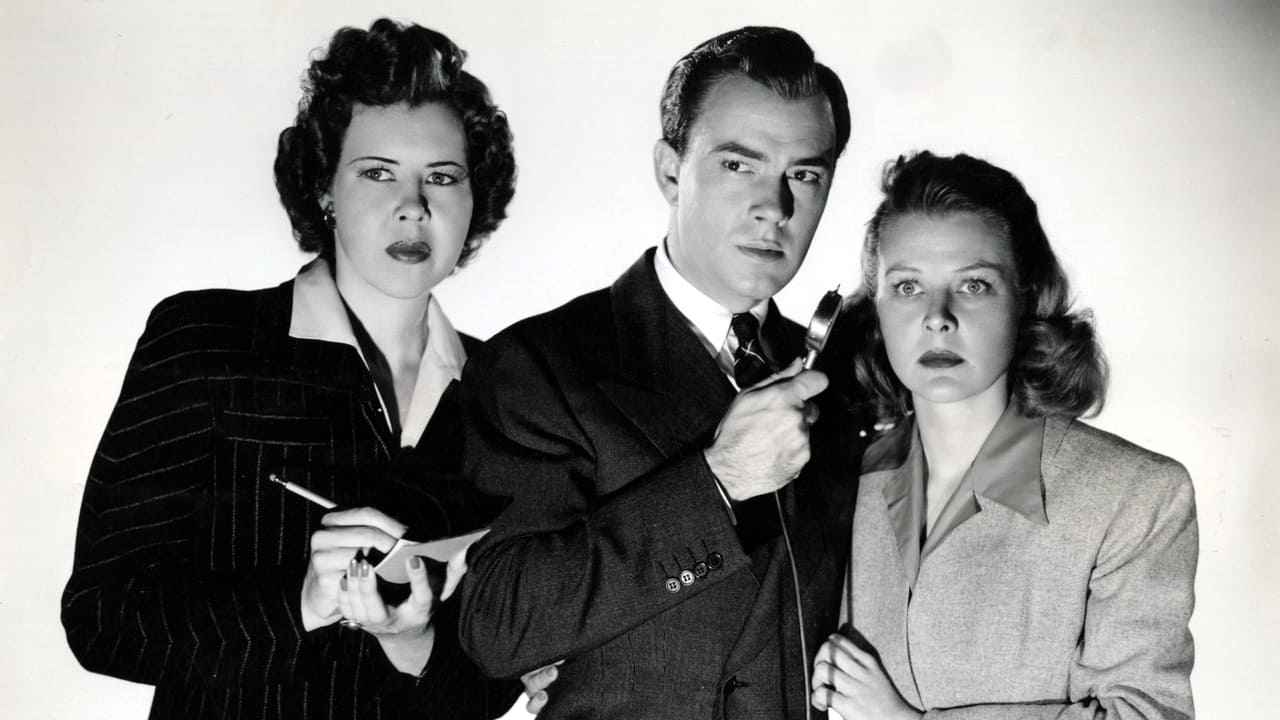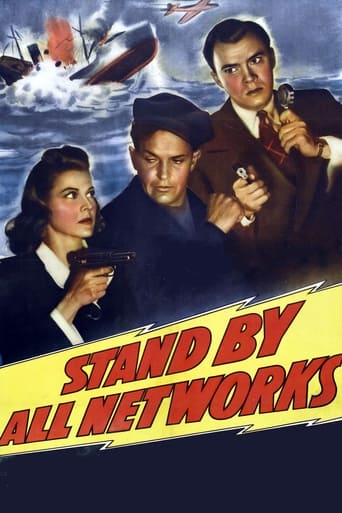

I am puzzled by this film's low rating. You couldn't ask for anything more of a B action film directed by the prolific Lew Landers. At the heart of the plot you have John Beal as radio reporter Ben Fallon, immediately before Pearl Harbor, trying to make his fellow Americans aware of what he believes to be acts of sabotage. He does have some clues - strange incendiary devices found at several disaster scenes, watchmen who have never fallen asleep before feeling like their coffee was drugged and then slumbering and then an explosion, a fire, etc. at a place of vital national interest should there be a war.Of course his boss at the radio station is mainly interested in not getting sued or having the FCC come down on him, but at one point he says something wise and thoughtful - Ben has the list of the names of a ring of spies and he wants to broadcast those names. His boss asks him - even if he's right, what if he's just tipping these spies off by broadcasting the names? What if the authorities know about these people and he ruins any sting operation already in progress? Bull-headed Ben is undeterred by his boss' questions and forges ahead with his investigation. One of the silliest aspects of the whole plot is this - why didn't Ben turn over the evidence he had to the government he was so badly seeking to preserve? But I digress.There is no character development to speak of, but then there is no time for such niceties as this thing charges from scene to action packed scene. It turns out there are both spies and American government agents just under Ben's nose the whole time and it won't be immediately obvious to you who is who. Then comes Pearl Harbor, and long after Ben has been fired from the radio station, the greatest mystery of all - what sounds like Ben's voice is broadcasting propaganda telling people that resistance is futile and that they should not resist any invasion. So now Ben's a wanted man himself and he must hunt down the source of these impersonated broadcasts. Looking back at this today, this film is a double-edged warning. Sure, people were too complacent just prior to Pearl Harbor due to a long period of pacifism that followed WWI. It's telling people to wake up! Better safe than sorry! However, after WWII people took this message a little too much to heart and lists of names were all the proof that was needed to blacklist alleged Communists out of their professions for years. In this case there were many innocent people that were sorry and nobody was the safer for it.
... View MoreJohn Beal stars with Mary Treen in this feature, "Stand By for Networks," a 1942 B movie. Beal plays a newscaster who calls 'em as he sees 'em -- except nobody likes what he's calling and what he's seeing.Beal is Ben Fallon, and he's intrigued and bothered by attacks on American soil and begins to suspect treason. To Fallon, this is a call for Americans to get their heads out of the sand and to stop being isolationists. A friend has a list of suspected Nazi agents, which he manages to get to Ben (via Ben's secretary) before he's murdered. One of the people, Lela Cramer, works for the radio station.Before any of this can be exposed, Ben is fired but mysteriously is still broadcasting inflammatory material. He isn't, nor can he find out where these broadcasts are coming from, but the voice sounds like his and it's apparent he's being set up. Not only that - he's lost all credibility. He keeps digging.The message of not being complacent still rings true today, particularly after 9/11. Alas, it's a bad film - probably made fast and on the cheap with very little direction. First of all, the newscaster has a list of Nazi agents - I've carried tissue more carefully, but I wouldn't be walking around with a list like that. Why didn't he give it to the government? Second, I'm not sure a piece of tin is much help against a bullet - don't people shoot tin cans with bullets and aren't the cans damaged? And this was a pretty thin piece of tin. There are other things, but I won't go into them.John Beal and Mary Treen, who plays his secretary, are both very lively and energetic, and Treen is very funny. The problem there is that they're in a different movie. Beal in fact seems like he's on stage. The others around him aren't putting forth much. This is the fault of the director.All in all, not good. I met John Beal in the 1980s, a lovely man. When I see one of his films on TCM, I always watch them. He had a very prolific film, TV, and stage career despite starting out as a leading man in Hollywood and not quite making the grade. With films like this, I don't know how much of a chance he had.
... View MoreOn the cusp of WW II, Ben Fallon, NYC radio station WECA's roving reporter uncovers a massive sabotage ring, only to be threatened and discouraged by the government and his boss.The film's good news is threefold. It moves along briskly. There are several stand-out performances. As the lead, John Beal has a strong and enthusiastic voice. He comes across as a believable and likable reporter. As his clever secretary, Mary Treen steals the picture with her wisecracking. She adds oomph to all the scenes she's in. As the chief German saboteur, Alan Baxter conveys quiet menace. But he humanizes it with subtle nuances. Finally, the stock disaster footage is incorporated well.Unfortunately, the film's bad news is its script. Chicken wire has more holes. Here are just some of the problems. 1) Beal accumulates important evidence, but never thinks to turn it over to government authorities. 2) Monty, Beal's detective, burns up the incendiary evidence that proves a warehouse fire was set by demonstrating how it works. 3) While the government can't seem to figure out whether sabotage is occurring, or who's responsible, Monty discovers the gang's ringleaders overnight. 4) Apparently neither the undercover government agent, nor the station manager (who helped place her) report Beal has received Monty's list. 5) Beal is framed for murder and treason, but police demonstrate no interest in strong evidence to the contrary. 6) Rice is kidnapped, and Beal tells his boss he is going after her, but doesn't say where he's going. 6) When the police search the boat on which Beal and Rice are being held, Victor, the one-armed villain, says: "Don't move, Mr. Fallon, we're all well armed." (Oy!) 7) Then, at the film's climax, Beal and Rice escape their bonds, but are not killed or even retied when recaptured. Thus they escape again, and save the day.Jeez! Talk about a film being wronged by its writers. Its script only works for an audience that's been lobotomized. If the writers were paid, they should have done a better job, and if they couldn't, they should, at least, have been perceptive enough to credit their work to "anonymous."
... View MoreJust before America's involvement in World War II, Ben Fallon, a popular newscaster for radio station WECA of the United Broadcasting System, thinks he might be beginning to unravel the growing story behind mysterious attacks on American infrastructure. Suspecting fifth-columnists, he begins to mix personal opinion into his newscasts, saying that stronger official steps need to be taken to halt the growing danger. But broadcast management (fearing censure by the Federal Communications Commission) confronts Fallon, saying he's overstepping his journalistic bounds and becoming inflammatory by opinionizing during his newscasts.As friction mounts, revelations come forth from a tipster that a famous American might be connected to the destructive episodes. But the informant is found murdered, and when Pearl Harbor is attacked the reporter's investigations intensify, much to the consternation of his employers who keep insisting on only straightforward reporting of known facts, not conjecture.'Stand By All Networks' wastes no words or actions painting a concise portrait of complacent isolationist America just before and after the sudden Pearl Harbor attacks and, as the story progresses, you'll be reminded of another attack on America nearly sixty years later.
... View More